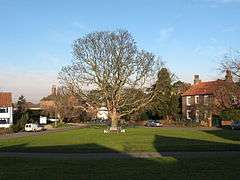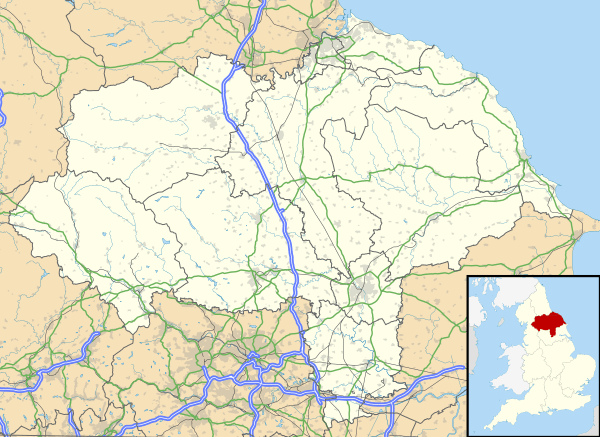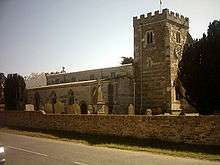Aldborough, North Yorkshire
Aldborough is a village in the civil parish of Boroughbridge in the Borough of Harrogate in North Yorkshire, England.
| Aldborough | |
|---|---|
 Aldborough village green | |
 Aldborough Location within North Yorkshire | |
| OS grid reference | SE405662 |
| Civil parish | |
| District | |
| Shire county | |
| Region | |
| Country | England |
| Sovereign state | United Kingdom |
| Police | North Yorkshire |
| Fire | North Yorkshire |
| Ambulance | Yorkshire |
Historically a part of the West Riding of Yorkshire, Aldborough was built on the site of a major Romano-British town, Isurium Brigantum. The Brigantes, the most populous Celtic tribe in the area at the time of the Roman occupation of Britain, used the settlement as a capital.[1] Isurium may also have been the base of the Roman Legio VIIII Hispana.
Archaeology
Aldborough was built on the site of a major Roman town, Isurium Brigantum, which marked the crossing of Dere Street, the Roman Road from York north to the Antonine Wall via Corbridge and Hadrian's Wall. Isurium Brigantum, after AD160, was the administrative centre of the Brigantes, the most populous British tribe in the area at the time of the Roman occupation. Traces of comfortable houses have been found, with many potsherds, coins and bronze, iron and other objects, and a large part of the town walls can be seen.[1] The Aldborough Roman Site museum, run by English Heritage, contains relics of the Roman town, including mosaic pavements.
History

Aldborough was mentioned in the Domesday Book as Burgh (Old English burh 'ancient fortification'). By 1145 the prefix ald (old) had been added.[2]
Aldborough lost much of its importance when the river crossing was moved to Boroughbridge in Norman times. In the Middle Ages it was made a Parliamentary Borough, and returned two Members of Parliament (MPs) until the seat was abolished in the Great Reform Act of 1832.
Aldborough was a large ancient parish, which included townships in both the West Riding of Yorkshire and across the River Ure in the North Riding. In the West Riding the parish included Aldborough, Boroughbridge, Lower Dunsforth, Minskip, Roecliffe and Upper Dunsforth.[3] In the North Riding the parish included Ellenthorpe and Milby.[4] All these places became separate civil parishes in 1866.[5]
In 1938 the civil parish of Aldborough was abolished and merged into the civil parish of Boroughbridge. In 1974 Aldborough was transferred from the West Riding to the new county of North Yorkshire.
References
- Chisholm, Hugh, ed. (1911). . Encyclopædia Britannica. 1 (11th ed.). Cambridge University Press. pp. 530–531.
- Smith, A.H. (1961). The Place-names of the West Riding of Yorkshire. 5. Cambridge University Press. p. 80.
- GENUKI website. Yorkshire West Riding: Aldborough Parish
- The ancient parish of Aldborough: historical and genealogical information at GENUKI.
- Vision of Britain website
External links
| Wikimedia Commons has media related to Aldborough, North Yorkshire. |